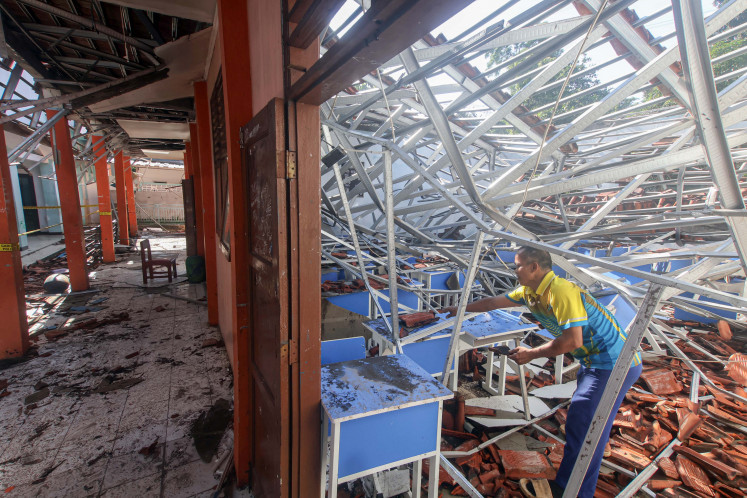Popular Reads
Top Results
Can't find what you're looking for?
View all search resultsPopular Reads
Top Results
Can't find what you're looking for?
View all search resultsYudhoyono launches second attempt at five-year economic plan
Susilo Bambang Yudhoyono’s new administration, backed by the Indonesian Chamber of Commerce and Industry (Kadin), is working on an economic road map for the next five years, which will be unveiled at the National Summit later this week
Change text size
Gift Premium Articles
to Anyone
S
usilo Bambang Yudhoyono’s new administration, backed by the Indonesian Chamber of Commerce and Industry (Kadin), is working on an economic road map for the next five years, which will be unveiled at the National Summit later this week.
The work will begin by defining failures and challenges left by the previous government, which have held Indonesia back from reaching its economic potential.
The economic roadmap is expected to determine which regulations and incentives are needed by the government and businesses to accelerate growth in the real sector, said Chris Kanter, Kadin’s vice chairman on investment, after a meeting with economic ministers over the weekend.
Chris said Kadin was adamant about the need for the government to make progress in solving problems related to land acquisition, which had severely delayed and undermined the development of essential infrastructure projects.
A similar initiative on an economic road map was taken at the beginning of Yudhoyono’s first presidential term in 2004.
The 2004 road map focused on the reform of the investment climate, labor regulations, taxation and infrastructure. Yudhoyono’s first term saw a successful revision to the investment law and the taxation laws.
Revision to labor regulations was left untouched due to political pressure from vested interests while progress in the field of infrastructure was very poor, particularly in areas like electricity production along with inadequate progress on the improvement of the road network.
Improved infrastructure will help reduce the negative impacts of a high-cost economy that inflates the price of goods and services. High inflation is hurting people’s purchasing power, which contributes about 60 percent of the economy.
Hariyadi Sukamdani, Kadin’s vice chairman of fiscal policy, said the government was likely to adopt 90 percent of the ideas drafted by Kadin on what needed to be done with the economy in the next five years.
“The coordinating Minister for the economy [Hatta Radjasa] said the government would prioritize partnership [with stakeholders] in the future,” he said.
Hariyadi said Kadin had suggested that the government provide incentives to businesses, such as eliminating the visa-on-arrival to attract more tourists and issuing a regulation on land clearance.
The government expects the economy to reach 7 percent growth by 2014. The economy grew by an average of 5 about percent during the last five years.
The summit, to be held on Oct. 29-31, will involve 1,200 stakeholders, such as mayors, regents, governors, legislators, businesses, ministers and observers.
— JP/Aditya Suharmoko, Alfian










